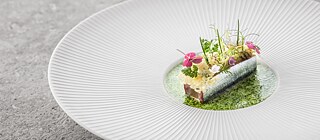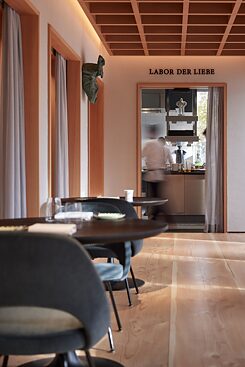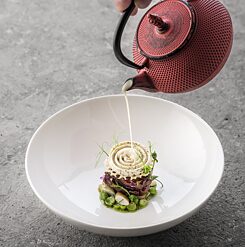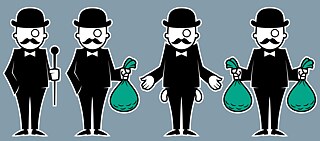The Future of Gastronomy An Atmosphere of Warmth and Geniality

Bratwurst rather than caviar: Three-star chef Jan Hartwig on emotional culinary experiences, sustainability in gourmet restaurants and artificial intelligence in the kitchen.
 The kitchen at JAN restaurant – the “laboratory of love”.
| Photo: © Konstantin Volkmar
Jan Hartwig, what in your opinion is a culinary experience that everyone should have at some time or another?
The kitchen at JAN restaurant – the “laboratory of love”.
| Photo: © Konstantin Volkmar
Jan Hartwig, what in your opinion is a culinary experience that everyone should have at some time or another?
I would want everyone to be able to enjoy meals that are prepared with love. It doesn’t have to be a dinner cooked by a Michelin-starred chef! I do not believe that it makes sense to say that everyone should try truffle and caviar at least once in their lives. Not at all. Gourmet and luxury cuisine is subjective. Luxury can also mean throwing a simple bratwurst on the barbecue at home with my family. If that’s something you only have time for once in a blue moon, it can be the most wonderful meal ever. For me, culinary experiences are closely related to emotions. Even when I give it my all as a chef, the experience can be spoilt if guests end up arguing that evening. It is not necessarily about a particular dish or product, it’s about the overall experience.
What awaits guests at your three Michelin-starred restaurant in Munich, which you have named after your own first name – JAN?
At atmosphere of warmth and geniality – I want my guests to feel as comfortable, at ease and welcome as if they were at my home. When one goes to a restaurant decorated with three stars, one knows that this is as good as it gets. The product must be absolutely extraordinary and taste fantastic. Our cuisine is characterized by diversity and embraces seemingly simple products, which in the past was inconceivable in three-star restaurants. We serve up not only truffle, but also pork belly.
When dealing with meat and fish, do you use the entire animal for the dishes you serve up in your restaurant? Or what is your approach when it comes to meat and fish?
Yes, I use the entire animal, though I do not always buy whole animals because we cannot handle them logistically. I simply lack the space to store entire animals. To give you just one example, I use not only the fillet of a trout but also its head and bones to make a broth and its liver to make a flan. Unfortunately, offal is not as popular in Germany as it is in other parts of the world. Offal is highly prized in Hong Kong or Tokyo, for instance.
We need to decide more consciously how and when we want to eat meat.
Given the rise of lab-grown meat and growing expectations of the vegetarian options on menus, what role will sustainability play in the future of gastronomy, in your opinion?
Overfishing, ethical concerns about frog’s legs, working conditions – people didn’t care about those kinds of things when I was training to be a chef. We need to follow the principle of “live and let live” and decide more consciously how and when we want to eat meat. As indeed we did in the past, when a Sunday roast would be something one had only once a week. Beyond Meat is one of the issues becoming increasingly relevant, as is vegetarian cuisine. More body awareness will also be important in the future: people want to eat more healthily. It will also be about people’s wellbeing, fair working conditions and preventing exploitation.
You enhance the experience of your guests by selecting products carefully and by preparing and serving them artistically. Where do you stand on developments such as AI-based recommendation systems or fully automatic kitchen appliances?
I feel ambivalent about it: technology has its advantages, and I am by no means someone who thinks purely in analogue terms and mourns the passing of the good old days. That said, cookery is a skilled craft, and if we were to stop using our hands to feel the ingredients or were no longer to smell and taste them or judge them visually, the job would lose its appeal for me. There are many jobs that I do wearing gloves, but some things, like dough for example, just have to be handled directly to get a true sense of their condition. I wear gloves when I’m gutting ducks or filleting fish for instance, but that’s more a question of convenience. It’s the quality of the products that is crucial. If all of this is done by AI, it’ll be good night Germany.
 Sweetbreads, sake beurre blanc, dried caviar butter.
| Foto (Detail): Restaurant JAN © Pieter D'Hoop
What do you hope will happen instead?
Sweetbreads, sake beurre blanc, dried caviar butter.
| Foto (Detail): Restaurant JAN © Pieter D'Hoop
What do you hope will happen instead?
I hope that acceptance of the high art of gastronomy will increase in Germany. In France, top chefs are celebrated as national heroes. When Macron hosts a party at the Elysée Palace, the country’s ten best chefs are invited to cook for it, like Ducasse and others. Imagine Olaf Scholz did something similar with leading German chefs – it would probably spark public outrage, along with accusations of wasting tax-payers’ money. Gastronomy is not only about eating expensive caviar with a silver spoon or sipping champagne. It’s about our cultural heritage. Eating and drinking brings people together, it unites families. It is history, tradition, culture, all rolled into one.


